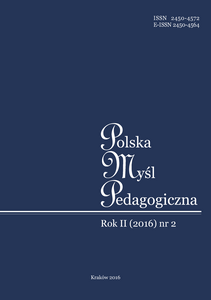Znamiona realizmu w koncepcji pedagogicznej Edmunda Bojanowskiego oraz w podstawach procesu jej zmian adaptacyjnych i zachowania tożsamości
Signs of realism in the pedagogical concept of Edmund Bojanowski and in the fundamentals of the process of its adaptive changes and the preservation of identity
Author(s): Maria Loyola OpielaSubject(s): Christian Theology and Religion, Anthropology, Education, Metaphysics, Ethics / Practical Philosophy, Philosophy of Mind, Philosophy of Religion
Published by: Wydawnictwo Uniwersytetu Jagiellońskiego
Keywords: Edmund Bojanowski; realism; person; religion; anthropology; integral education; pedagogical concept; identity;
Summary/Abstract: Opening orphanages, E. Bojanowski created and perfected his pedagogical concept of education. He shaped its philosophical base in terms of realism, which is only possible in a context that is consistent with a factual reading of the world in which people and things exist. He based his thinking on philosophical anthropology, the Bible, and the Church's teachings, which indicated that man is a unity of body and soul, a person, a child of God. This integral and realistic conception of man resulted in the need for his integral development and education. Bojanowski created a system of early education that takes into account the achievements, in thought and practice, of the Church in education, culture, history and tradition, as well as the specificity of the natural environment, the overall factors influencing the child's upbringing and the organization of institutions. Fidelity to accepted assumptions still ensures the continuation and implementation of adaptive changes while maintaining the identity of the concept and the reconstruction of his integral pedagogy in relation to realistic Thomistic philosophy.
Journal: Polska Myśl Pedagogiczna
- Issue Year: 2/2016
- Issue No: 2
- Page Range: 199-214
- Page Count: 16
- Language: Polish

